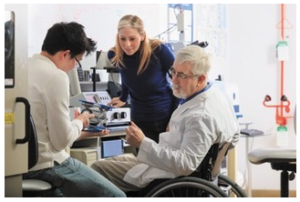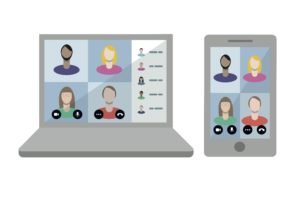Let COVID-19 Expand Awareness Of Disability Tech
Let COVID-19 expand awareness of disability tech - New article from Nature.com online journal
The pandemic’s disruption shows how much academia could learn from the disability community.
Written by Ashley Shew who is an assistant professor in the Department of Science, Technology, and Society at Virginia Polytechnic Institute and State University in Blacksburg.
Disabled people including myself have long campaigned for accommodations to help us live our lives. The COVID-19 pandemic shows that these are not as impractical as we have always been told. Supermarkets, restaurants and pharmacies (even outside cities) can deliver; remote working, medicine and education are possible for many; and social lives can be rewarding without requiring us to leave home.
 All around me, I see academic colleagues adopting disability-led hacks and long-sought accommodations. I wish everyone had thought about these workarounds — and about disabled people at all — earlier. When lockdowns end, we must not forget these lessons, not least because the pandemic will disable people, and the impacts will be felt most by the most vulnerable parts of society.
All around me, I see academic colleagues adopting disability-led hacks and long-sought accommodations. I wish everyone had thought about these workarounds — and about disabled people at all — earlier. When lockdowns end, we must not forget these lessons, not least because the pandemic will disable people, and the impacts will be felt most by the most vulnerable parts of society.
Academia is paying for its ableism. At many universities, in-person research with human participants and in laboratories has been curtailed. If these projects had considered disabilities, they might be better off: disabled academics already plan in short increments, with built-in flexibility.
In 2014, I returned to my job as an assistant professor, newly multiply-disabled — a hard-of-hearing amputee battered by chemotherapy and more. I felt out of place. I could no longer access many spaces, including most of my colleagues’ offices, and I sought the camaraderie of other disabled faculty members, staff and students. My disabled comrades and I recognize the diversity of disabilities: congenital and acquired; ranging from cognitive to sensory, mobility and more; apparent and not. Many of us pursue research that emphasizes how disabled people are the best experts on the technologies and structures that meet our needs.
Disability awareness: The fight for accessibility
One of my projects examines accounts of disabled people’s lived experiences with technologies, and how they differ from those of the scientists and engineers behind the tech. I planned my work intending to recruit disabled students among my researchers. Most of the studies can be done remotely, even from bed, and on a funky, asynchronous timetable as needed. Last year, when I had lung surgery, my group shifted gears without worry. And because of its disability-led design, my team’s project is pandemic-proof.
 Another project, to gauge the experiences of students in civil-engineering classes, was designed to include participants with a range of disabilities. So we obtained approval for flexibility in communication format: we conduct our interviews by text, e-mail, Zoom and other means. Because we planned for disabled people to lead and participate in the research, we’re well prepared for the current situation — or for any other.
Another project, to gauge the experiences of students in civil-engineering classes, was designed to include participants with a range of disabilities. So we obtained approval for flexibility in communication format: we conduct our interviews by text, e-mail, Zoom and other means. Because we planned for disabled people to lead and participate in the research, we’re well prepared for the current situation — or for any other.
Many disabled people are also adept at managing our energy, and forgiving ourselves for not always meeting conventional metrics of ‘productivity’. My non-disabled colleagues are now struggling to adjust, but my team appreciates that ‘clocks should bend to our bodies’, not the other way around. Some disabled people call this concept Crip Time, reclaiming a derogatory term in pride (much like ‘queer’ for many LGBT+ people).
The disability community creates and lobbies for technologies and infrastructure that work better for all. Deaf and disabled people fought hard for things such as captioning on television, which has since become ubiquitous in sports bars and airports and can now be appreciated by people streaming media while those they live with rest or work.
The bitter irony is that, at the moment when non-disabled — or not-yet-disabled — people are beginning to normalize these disability hacks and hard-won infrastructure, society’s disregard for disabled people is clear. We are dying of COVID-19 in greater numbers than are non-disabled people, in rehabilitation facilities, state institutions (including prisons), group homes and care homes.
Many accommodations demanded under COVID-19 were implemented within weeks, including the ability to work from home, to have flexible schedules, to get what we need without excessive and demeaning documentation, to share and celebrate creative adaptation, to work with the knowledge that all schedules can change. These are all things that disabled and chronically ill people have wanted for a very long time. I hope that when we’ve flattened the curve and saved as many people as possible, we don’t return to a world in which disabled people are ignored (especially when COVID-19 will probably produce more of us).
Science must rise up to support people like me
![]() So start making changes that should have been standard all along. Plan creatively and accessibly to allow more work offsite, and to include people whose clocks aren’t steady. Welcome suggestions from disabled colleagues and students about how to make the environment work best for their neurotype and schedule. Be ready to take criticism: too often, work is set up as dictated by convention, rather than by calling on relevant experiences and possibility.
So start making changes that should have been standard all along. Plan creatively and accessibly to allow more work offsite, and to include people whose clocks aren’t steady. Welcome suggestions from disabled colleagues and students about how to make the environment work best for their neurotype and schedule. Be ready to take criticism: too often, work is set up as dictated by convention, rather than by calling on relevant experiences and possibility.
Make your teaching and scholarly materials multi-modal: produce formats that work for people with different physical conditions and ways of reading and communicating, sharing and contributing. Think about multiple ways to allow participation in your funding, reviewing, research and engagement. Let’s see an end to patronizing objectification and assumptions about what we want and need: include disabled people in boards, teams and studies, and learn from us. We have had to become masters of invention. The pandemic has made the value of that clearer than ever.
Nature 581, 9 (2020)
05 May 2020, by Ashley Shew
